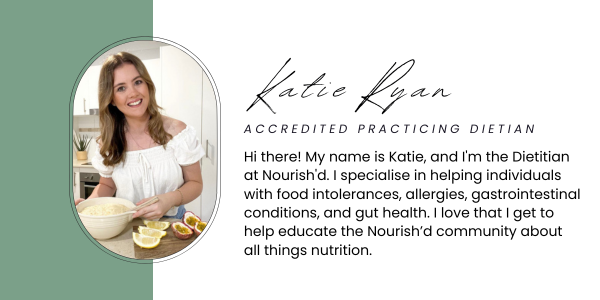Did you know that an estimated 80% of people with Coeliac Disease don’t know they have it? 1 in 70 Australians are estimated to have Coeliac Disease, yet roughly 4 out of 5 remain undiagnosed. For those who remain undiagnosed, they can have long term effects, such as chronic inflammation, poor nutrition, and malabsorption of nutrients.
Coeliac Awareness Week is very near and dear to our hearts at Nourish’d. Unbeknownst to many, CEO & Co-Founder of Nourish’d, Abbey Cameron has an extreme gluten intolerance. Before creating Nourish’d and being diagnosed with this condition, she struggled with fatigue, headaches, joint pain, extreme gut discomfort, and other debilitating symptoms that many face when suffering with Coeliac Disease and other gluten intolerances. Coeliac Awareness Week aims to raise awareness about Coeliac Disease.
What is Coeliac Disease?
Coeliac Disease is an autoimmune disorder that involves the immune system mistakenly attacking stomach tissue when someone eats gluten (gluten is a protein found in wheat, barley, rye, and oats). The bowel and intestinal damage often leads to gastrointestinal and malabsorptive systems, such as vitamin deficiencies.
What are the symptoms of Coeliac Disease?
The symptoms of Coeliac Disease can look different on each person, and some people can even be asymptomatic (e.g., show no symptoms). However, common symptoms of Coeliac Disease can include the following:
- Gastrointestinal problems such as diarrhea, constipation, nausea, etc.
- Fatigue
- Iron deficiency and/or other vitamin and mineral deficiencies
- Delayed puberty in adolescents
- Weight loss
- Mouth ulcers
- Skin rashes
Those that suffer from Coeliac Disease and gluten intolerances will remain sensitive to gluten throughout their entire life. What does this mean for their diet? The only recognised medical treatment for Coeliac Disease is following a strict gluten free diet to allow the bowel lining to heal and for symptoms to resolve.
Are there any benefits to eating gluten free?
While many individuals with Coeliac Disease and/or gluten intolerances need to be on a gluten free diet to remain healthy and happy in everyday life, many others choose to go gluten free for a range of health benefits including:
- Relieving digestive symptoms
- Boosting energy
- Reducing chronic inflammation
- Maintaining a healthy weight
Are gluten free meals still delicious?
Absolutely! After discovering that following a gluten-free diet could help manage Abbey’s symptoms, she and her husband Dave began a mission to create a meal delivery service that could not only help her, but also help others struggling to find delicious food to cater to their dietary restrictions.
One thing you will find when eating gluten free is that you really don’t need to miss the gluten-filled recipes you used to love! At Nourish’d, we make our meals with whole-health fuelled substitutes so you get a nutrient packed alternative with no fillers.
How can I help spread awareness about Coeliac Disease Awareness Week?
If you or someone you know may be struggling with undiagnosed Coeliac Disease and/or a gluten intolerance, we urge you to take action and get screened. Coeliac Disease is progressive, meaning the symptoms will continue to worsen as you get older.
If you or someone you know has recently gotten diagnosed with Coeliac Disease and/or gluten intolerance and is navigating their new lifestyle, we recommend checking out Nourish’d meals to take the guesswork out of whether or not what you are eating is gluten free. We have over 60+ gluten free meals on our menu that can be ordered every week. Our menu is 100% gluten free and 100% preservative free. Orders close at 5pm AEST every Thursday. Order today at nourishd.com.au
For more information on Coeliac Awareness Week please visit the following resources:
Coeliac Australia: https://www.coeliac.org.au/s/
Yum Gluten Free Magazine: https://yumglutenfree.com.au/
Health Direct: https://www.healthdirect.gov.au/coeliac-disease



.png)